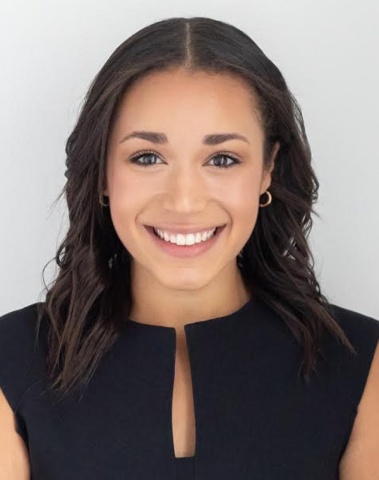“After my first semester at the Ford School, it was like night and day: the way that I was able to understand complex policy concepts in such a helpful way and also just feeling very supported by the BA community while doing so.”

Matisse Rogers
First job out of Ford School: Associate, Hamilton Place Strategies
Matisse Rogers (BA ‘19) is an associate at Hamilton Place Strategies (HPS), a public affairs consulting firm based in Washington, DC. She believes that helping her clients be clear, concise, and persuasive in their communication has helped them achieve incredible results with far-reaching impact: “Public affairs consulting has a bigger impact than what immediately meets the eye, and that's what's so compelling about it. Everything we do is informed by issue expertise and a deep understanding of the policy landscape.”
Like most consultants, Rogers has her hands in a few different projects at once, which allows her to maximize her on-the-job learning experiences. Her clients include businesses, trade associations, and other organizations whose work involves government policy. She utilizes data and analytics — rooted in things ranging from opinion polling to Labor Department data to text analysis — to help understand her clients’ challenges and then explain those issues to policymakers and other critical stakeholders.
One of the organizations Rogers works with is the Rare Disease Diversity Coalition. She helps them achieve their goals through communication — sharing research, increasing membership, striving for resources for minority patients living with rare disease, and more. Day to day, Rogers researches the nuances of rare disease policy, distills it into easily digestible content, and produces deliverables like fact sheets, one-pagers, and social content to reach non-Beltway audiences. In assembling the coalition, she works with experts across the healthcare and diversity spaces to signal the breadth of support for the issue, and ultimately, reach policymakers.
Rogers says that she always tries to keep her client’s end-goals, and their impact on everyday people, in mind as she does her work: “There are millions of Americans with these health disparities that we're trying to help through this coalition. Even though we're a couple of degrees removed from them, it’s important to keep in mind that these are ultimately the communities being impacted by this work.”
According to Rogers, her experience at the Ford School was key to landing her first job out of college at HPS, as well as her early successes there. “I am incredibly grateful that the Ford School prioritizes writing as much as it does,” she said. “In public affairs we are tasked with simplifying incredibly complex policy issues, not only into a product that's short, like a tweet or a blog post — but also simplifying it in a way that's going to resonate with everyday Americans.”
Speaking broadly of the Ford School’s course offerings, Rogers said that they foster strategic and analytical thinking and push students “to think through different scenarios and who's impacted in each of those different scenarios.” She was particularly fond of Betsey Stevenson’s Macroeconomics for Public Policy class, “where everything was framed using an analytical and applicable policy lens.”
It was the Ford School’s powerful alumni network that helped connect Rogers to HPS during her senior year. “I asked [a Ford School alum who worked at HPS] for coffee and she told me a little bit more about public affairs consulting, and that's how I found HPS.” Now she urges other students to do the same: “Don't be afraid to reach out because the scenario could be like the one that I experienced, where I ended up in a job that I’m extremely happy with from that one chat. Michigan alumni are constantly seeking to pay it forward by helping current students and giving advice.”
Rogers enjoys how her job combines policy and communications and also understands how influential it can be. “On every single project, there are times where if you are really persuasively communicating about an issue, you see academics and think tank leaders in the space responding to your message positively. You see community resonation with our messaging, and that's really where you see your work shine through.”